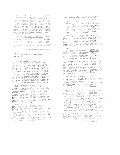 The scrap I think of as an epigraph for this book comes from Auden's 'The Shield of Achilles'. Here the sea-nymph Thetis asks Hephaestos, armourer of the gods, to make her sone Achilles his famour shield; but instead of putting on it the decorous classical images expected, he engraves the true face of modern or future war. The poem ends: 'Thetis of the shining breats / Cried out in dismay / At what the god had wrought / To please her son, the strong / Iron-hearted man-slaying Achilles / Who would not live long.'
The scrap I think of as an epigraph for this book comes from Auden's 'The Shield of Achilles'. Here the sea-nymph Thetis asks Hephaestos, armourer of the gods, to make her sone Achilles his famour shield; but instead of putting on it the decorous classical images expected, he engraves the true face of modern or future war. The poem ends: 'Thetis of the shining breats / Cried out in dismay / At what the god had wrought / To please her son, the strong / Iron-hearted man-slaying Achilles / Who would not live long.'
Reading OTHER DAYS, OTHER EYES, I feel that (rather than the Frankenstein image) one might think of Al Garrod as a curious combination of Hephaestos, Achilles, and Thetis – artificer, killer, victim, and dismayed onlooker. He is not unparalleled ass a character in $F; but not negligible either.
BEYOND THE RESURRECTION by Gordon Eklund, Doubleday, $5.95
This book relies to some extent on parallels with the Crucifixion. Its action spans three days (and the title suggests, I suppose, that these are, as it were, Good Friday to Easter Sunday); its basic
plot turns on the appearance of a boy or mutant or product of gene surgery,
Who teaches everyone to love and understand each other; and in the end the boy is shot by an agent of the Establishment, who nevertheless realizes in the end that the boy August was a "chemically created messiah, the Christ of the scientific age" While he himself has been both Judas and Pontius Pilate, but will also be St. Paul.
The book ends with the various "disciples" scattering to preach not the
Word, but the technique of physical fusion
enlightenment. This is a daring theme, which is August's method of conversion or
not because it attracts the charge of blasphemy (no longer something easy to define) but because it invites comparison with the many powerful narratives based on the Passion itself; and I do not think that this book is strong enough to bear the parallels it hints at.
Indeed in some ways it struck me as rather claggy book in a peculiary American style. The assault on "respectable" values is event and determined, so that as soon ~s someone is mentioned as having a "very bite house" and a "lovely garden" and "two 0elightful children", or as being "healthy and happy and whole", you know that the adjectives are ironic, and really mean that the characters concerned are repressed, conformist, and inhibited.
Nevertheless, the final statement of truth and challenge would not be all that out of place in Woman and Home either :
Being human is just understanding each other. All our troubles are communication problems. It may be sheer malevolence on my part (though of so it's caused by imperfect communications and you mustn't blame me) but I feel a strong urge at such points to run and fetch the new Pontius his hammer and his nails.
I~ is true that such coy questioning appears only now and then in BEYOND THE RESURRECTION, but the attitude it embodies seems to be inseparable from the central miracle itself, August's power to melt into the body of another person, and to teach his acolytes to do the same.
In a couple of places this is described physically with a certain gruesomeness, but at no point did I find myself misled into thinking that he was a monster from Outer space - his benignity was too evident, and so was the suggestion that the fusion ~&s a physical analogue or even allegory of/what we would all wish to do mentally or spiritually.
Besides, his talent was seen by some characters at least as only a continuation of the basic dedication of the experimental school (where the story it set) to
Intensive Therapy. So the question of self-knowledge hangs over the book fairly consistently, without being illuminated very much.
And the setting brings up several other queries and discontents, at least to my mind. One is that we never learn much about Intensive Therapy itself, though it would seem both an interesting and a necessary, topic. Instead the author remarks, apparently in his own person, that it goes on "until the child was simultaneously living and reliving all of his lives (and there were a great many, Larkin discovered)", and then largely drops the subject. We are all reincarnated ? This is accessible to discovery ? You'd think this would at least cause some talk, even in the year 2004
But it doesn't. Nor do we heal much about "the war" in the background. We never learn anything about the physical basis of
August's ability. And while the school,
(Concluded on Page 33)
Document scaning and conversion provided by Peter Barker
Updated May 12, 2015. If you have a comment about these web pages please send a note to the Fanac Webmaster. Thank you.